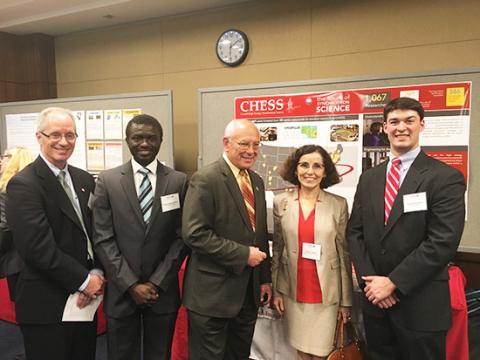The coalition hosted its 23rd annual event on Tuesday, May 16, 2017; this year’s theme was “Investments in Scientific and Educational Research: Fueling American Innovation.” The CHESS poster “The future of synchrotron science” showcased work by David and Chris, displaying how the investment in education at CHESS produces outstanding results.
Engineering graduate student Chris Budrow recalled, “It was a great experience. I thoroughly enjoyed being able to present my research to others. It really made me think about the challenges scientists face when communicating science to the public.”
We were fortunate to have Representative Tonko (Albany, New York) visit the CHESS table and, to everyone’s surprise, find out that he and Chris attended the same college and both majored in engineering. “Meeting a congressman was a great experience,” recalls Chris. “I was impressed with how even in a few minutes Representative Tonko was able to grasp how important our research is for progressing and improving mechanical design.” The Congressman was so excited about the work that when the NSF Director France Córdova entered the exhibit room, he brought her to the CHESS table and started, himself, to explain the research tools and results.
Materials Sciences graduate student David Agyeman-Budu noticed that he and Chris might have been the only grad students at the exhibit. David recalls, “…that led to discussions about the grad experience and how we fit into CHESS as an organization in general. Since we were Cornell students, there were people who had a Cornell (and Ithaca) connections and wanted to just talk to us to reminisce.” He adds, “it was very reassuring to see the amount of enthusiasm that the congressman had for science and his willingness to promote it in good faith.”
The day included visits from Congressional staffers and National Science Foundation personnel and program officers. It was an honor to have Ms. Córdova engage with Chris and David about their compelling scientific research at CHESS. Ms. Córdova’s office oversees all Foundation activities from the development of policy priorities to the establishment of administrative and management guidelines, including long-range planning for the National Science Foundation.
CNSF is an alliance of over 140 professional organizations, universities and businesses united by a concern for the future vitality of the national science, mathematics, and engineering enterprise. CNSF supports the goal of increasing the national investment in the National Science Foundation's research and education programs. These programs increase and develop the knowledge base needed for pushing the frontiers of science, mathematics and engineering disciplines, contribute to the development of the future science and technology workforce, underpin new fields of inquiry, and promote interdisciplinary research and education, all of which facilitate technological innovation.
